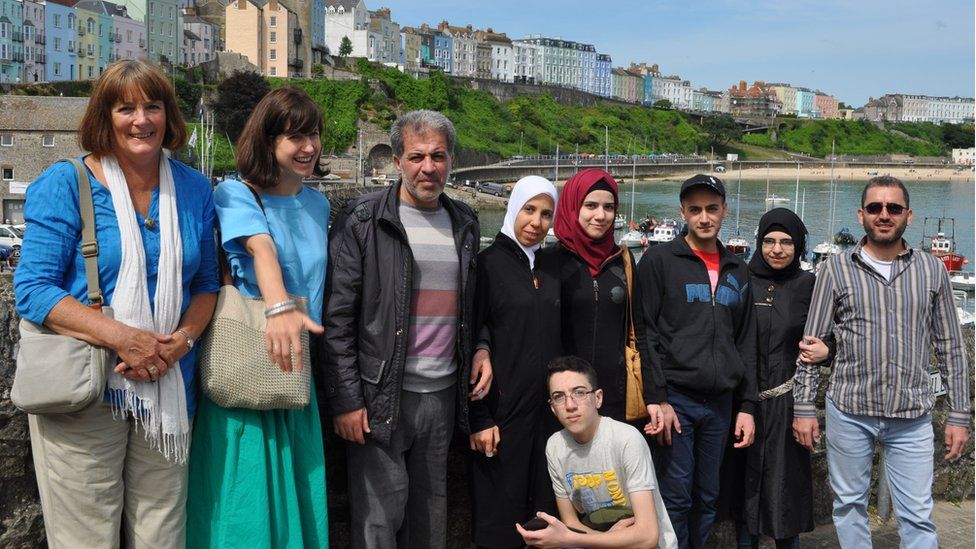Syrian refugee in Narberth: 'Wales reminds me of home'
- Published

What surprised Safaa Batak most when she arrived in the UK to begin her new life was how much west Wales looked like the region of Syria where she grew up.
"All the way from the airport, everything was very beautiful and I felt like I was seeing part of my country.
"I was born in a place similar to here. The weather, the scenes, even the designs of the houses," she told BBC Radio Wales' Eye on Wales programme.
"Even when we see people on the beach in Tenby, it is the same. We are used to tourists on the beaches in Syria.
"It is not exactly the same but it is close. That's why I felt like it was my country."
Perhaps this unexpected similarity is why Mrs Batak, 45, and her family have settled in so well.
They live in Narberth, a market town in Pembrokeshire, and were among the first Syrian refugees to arrive under the government's Community Sponsorship Scheme, set up in July 2016.
It helps communities to offer new starts to refugees, including victims of Syria's six-year civil war.
In the Batak's case, they spent four years as refugees in Egypt before being picked for the scheme and flying to Birmingham Airport in July, with all their belongings on four airport trolleys.
When the Narberth group - Croeso Arberth - meaning Narberth Welcome - initially began the formidable task of offering to host a family, there was some concern they might not fit into their small town, with no mosque or real Muslim presence.
But the opposite has proved true.
The young men in the family regularly play five-aside with the locals and trips to the beach are frequent.
And Mrs Batak's husband, Ahmad, too, is trying to improve his English by volunteering in a cafe.
He dreams of opening his own cafe with his brother, Huseen, 34.
Mr Batak, 49, said: "I used to run a sweet factory in Damascus, while Huseen embroidered logos.
"But now I go to the cafe to learn English and to learn ideas about cafes because this will be our next business."
He said it was "not nice" sitting at home without work, adding: "I want to give something back to the community."
Mr Batak said he had also bonded with a man from Croeso Arberth over a universal issue - trying to quit smoking.
'Happy and healthier'
When he arrived in the UK, Mr Batak smoked 40 cigarettes a day, largely due to the stress of the Syrian war.
"Now, both this man and I haven't smoked for two and half months," he said.
"I feel happy and healthier than before and I look about 10 years younger."
To remind him of the birds he kept in Damascus, he also has chickens and doves in his garden.
"If we could have some sheep that would be even better. I'm joking, I'm joking," he said, roaring with laughter.
Mrs Batak has also settled in.
Her English is developing, she has joined a knitting group and she is busy looking after her three children.
She is also excited about becoming a grandma, with her 24-year daughter, Lamis, expecting her first child with her husband Ziad, 34.
But much of her happiness stems from the welcome of Croeso Arberth and the wider community.
Before a family could be relocated, the group had to prepare a detailed plan of how all their needs would be met, such as housing, schooling, an interpreter and language support.
And this support has continued post arrival, including help with trips to doctors and dentists.
Mrs Batak said it made them feel "very comfortable".
In many ways, their life now is much the same as in Syria.
"We go out and see people and friends," she said. "We have school to learn English. We do the housework.
"The group takes us to see things and, of course, we like the beach. We are used to it. Is there anything nicer than the beach?"
The couple's son, Adnan, 14, has started school, where he is learning English and Welsh, after missing six years of education.
And they hope their 19-year-old daughter, Falak, will soon be able to start college.
They even like the weather, describing the air as "nice and fresh".
Of course, they are aware of how much they have lost - not only belongings but their "nice, beautiful life" in Syria.
But at least they are safe.
The only thing that scares them?
"It's the dogs and cats," Mrs Batak said. "There are so many dogs when you go to Tenby. Our eldest daughter is vey scared of them.
"But apart from that, we are very, very happy."
So far, 53 Syrians have arrived across Wales via the Community Sponsorship Scheme, with Croeso Arberth among the first schemes set up, with money raised largely through sponsored events and donations.
In October, Narberth was presented with a human rights award by Liberty for its residents' efforts.
There are other groups in Wales: Croeso Abergwaun (Fishguard), Croeso Teifi in Cardigan and Aberaid in Aberystwyth.
And more in Haverfordwest, Penarth, Cardiff, Dinas Powys, Barry, Newport, Anglesey, Llantwit Major and Cowbridge are on the way.
Citizens Cymru Wales - the community-organising charity helping to sponsor and train them - estimates about a third of all UK applications next year will come from Welsh communities.
Resettled families have the right to live in the UK for five years, before applying for indefinite leave to remain.
Elsewhere, the government is pledging to resettle 20,000 refugees by 2020.
Listen to the full story, From Syria to Narberth Revisited. Eye on Wales, on BBC Radio Wales on Sunday 3 December at 18:30 GMT and is then available on iPlayer.
- Published29 November 2017
- Published18 October 2017
- Published22 July 2017